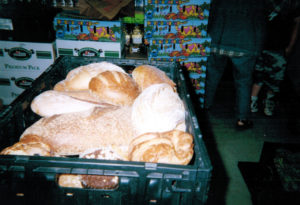Paul, Duct Tape, and Homelessness
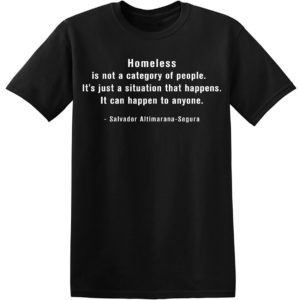
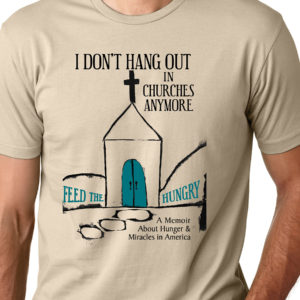
Paul has been on my mind all week.
One of my oldest friends, I knew him and worked with him when I worked and lived in Virginia – just outside Washington D.C.
Back then, we had Kelly Girls. Paul was my very best Kelly Girl. I could send him anywhere – well, not to the male chauvinist lawyer who would only pay for a cute legal secretary. But all the others loved his work.
He showed up on time for his assignments and he turned out a perfect work product. He was a bargain. Whatever he did, he made the client feel that Paul gave more than the money’s worth for every job done.
Everyone knew Paul was homeless. Nobody cared. He was the best typist out there. (This was before computers, you understand.) A quality work product counts for a lot when it comes time to pay the bill, after all.
So why have I been thinking about Paul all week? It was the Duct Tape that did it. My watch band broke and I need the watch. I drove over to Genter’s Jewelry Store in Saugerties and discovered a “for rent” sign where the “open” sign used to be. Mr. Genter always fixed everything . He didn’t care whether it was a watch band, a clock, a necklace.
He also sold silver and gold chains at bargain prices. And, he custom designed a coin for me. His work was exacting. Genter’s was my go-to destination for all things jewelry.
Genter’s is a statistic of the Coronavirus. With Mr. Genter gone, what was I going to do? I physically grieved when I saw the sign in the window.
I went straight for the Duct Tape. I now wear a watch held together with Duct Tape. I’m getting used to it, actually. My sense of urgency diminishes a little more each day.
I’m sure I’ll get along just fine with the Duct Tape. Paul Did.
Duct Tape adorned most of Paul’s clothes and anything else he used. Duct Tape held Paul’s shoes together. Duct Tape held the watch on Paul’s arm. Duct tape even kept Paul’s eyeglasses going. Finally, Duct Tape held Paul’s winter coat together.
So, following in Paul’s example, Duct Tape will keep my fitness watch going.
I rather like my new Duct Tape look. And, I like remembering Paul. He always made me smile. And, smiles these days are hard to come by.
Thanks Paul! You set a good example. This Duct Tape will work until I can find Mr. Genter, just as Duct Tape held your shoes together until you could find a newer used pair of shoes.
And, thank you for reading this article. Please forward it to your preferred social media network.
Thurman Greco
Woodstock, New York
PS: You can order one or more of the fancy T-shirts pictured in this post today at :
www.thurmangreco.com.
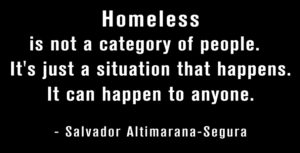
I also wrote about Paul in “No Fixed Address.”

Miracles – Because Hunger is Not a Disease

Miracles happened in the food pantry. It took me a while to realize this and then it took another while to accept that such a thing could happen in the basement of a small town church in Upstate New York.
I sneaked miracle stories in on the blog posts. I sneaked them on the pages of “I Don’t Hang Out in Churches Anymore”. Finally, I gave them their own pages – as much as I had the nerve for anyway, in a short book “Miracles”.
Research on miracles taught me some things.
I learned that miracles often include weeping statues, broken legs healing straight, relics, stigmata, and visions. The pantry miracles included none of those things.
Our miracles never really cured anyone. I never saw a statue weep, and no one came down with stigmata.
Instead, they showed us all how to grow and love and forgive. It was giving away the food that was the tip off for me.
As far as I can tell, the food pantry miracles were not the result of prayer.
God just showed up and brought food. Once he came disguised as a fireman. Each miracle was a complete surprise, a unique and different event. God came when the pantry shelves were bare and the lines were long.
I don’t think the miracles proved that any of the shoppers or volunteers were more faithful than anybody else in town. Frankly, I think that some of us saw the miracles as coincidences or something.
However they were seen, these events made an impact on a small number of people who saw them as they happened.
The clincher for me occurred when I finally realized and accepted a few basic things:
Carloads of food never showed up when we didn’t need it.
Boots never appeared on the shelves disguised as toothpaste in the summertime.
Nobody ever brought a handful of nails to fix the barn when the wall wasn’t falling.
Two books appeared on my desk out of the ethers: “Miracles” by Tim Stafford and “Looking for a Miracle” by Joe Nickell gave a feeling of legitimacy to my thoughts and memories.
Because of Tim Stafford, I wrote my book entitled “Miracles”. He was direct about a few things – one of them being that people should not spread “miracle gossip”. Because of his feelings about what he called “miracle gossip”, I’m compelled to relate the pantry miracle stories.
To sneak them in blog posts does not do them justice.
Thank you for reading this blog post. Please refer it to your favorite social media network.


Thurman Greco
Good Neighbor Food Pantry and Woodstock Library Close
“Woodstock is completely packed with Coronavirus refugees from Brooklyn. We’re doing more business here in the post office than we have every done. This post office is busier than any Christmas rush has ever been.”
What a day!
I got a call from someone earlier today. “The food pantry is closed, Thurman. How can this happen?” As I went by the Woodstock Library, I saw a sign: “Closed”
The Coronavirus affects us all. We cannot avoid the reality. People jokingly call our community Brooklyn North.
As long as you have a car and money and an apartment and a cell phone and a computer, all you have to worry about is the spread of germs. But, that’s not how it is with everyone. Without a car and money and an apartment and a computer and a call phone, your life tells a different story.
Without those luxuries, your lifeline requires a food pantry and a library.
The library is essential because it’s your ticket to information about food, housing, and anything else you need to find. A library will help you find everything you need to survive. And, while it’s giving you information, a library roof keeps you dry. The walls of the library keep you warm and comfortable while you seek all that you need.
And, of course, the library has one other luxury people don’t talk about much: a bathroom. If you are without food and a roof and a computer and a cell phone, a bathroom is essential.
So, while the Woodstock Reformed Church has closed its doors, most of the food pantries in New York state are figuring out how to get food to people. They are receiving support from the Food Bank.
In fact, the Food Bank of the Hudson Valley reports that volunteers are responding to every emergency request received. This includes food deliveries to seniors, quarantined and high-risk individuals, school back pack programs.
If you can get to a phone, there are a couple of phone numbers you can call. Try 845-399-0376 or 845-633-2120.
Sources tell me that many food pantries and soup kitchens are not closed. I truly hope you can find one.
So, what can we do? Well, for starters, try to contact people you know but seldom see and find out how they are doing. Do they need anything? Is there anything you can do?
Contact food pantries and soup kitchens in your area and see if they need anything. My bet is that they do. My bet is they need food.
Times are serious. Your help is needed!
If you run out of ideas, contact me at thurmangreco@gmail and I’ll send you, free of charge, my three action guides with practical tips for fighting hunger and homelessness.
Thank you for reading this article. Please refer it to your preferred social media network.
Thanks again!
Thurman Greco

What I Believe – Seniors in a Food Pantry
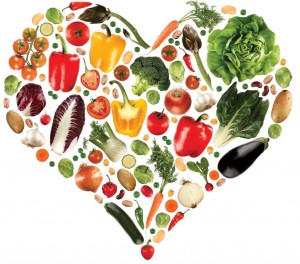
As seniors age, the courage we experience becomes more obvious as we feed hungry people. After all, what does a senior have to lose? Courage is a necessary part of the aging personality because our platform continually shrinks.
We’re often overlooked in the homeless arena. Those looking out forhomeless people focus on an older adolescent (especially if there’s an infant involved), and families. There’s just not much energy left over for hungry people seniors and cocker spaniels.
It never occurred to me that turning away hungry people in the pantry line was something I would do. Or could do. Or even consider doing. Turning away hungry people was not an option.
I came to the pantry as a crone or harridan depending on the circumstances and a person’s attitude toward me and my attitude toward hunger. I brought already formed opinions and beliefs, many of which were with me at birth.
Some argue that people are born as blank slates. I can’t agree. For one thing, I never experienced a blank slate when it came to hungry people. I didn’t have an “aha” moment when I met my first hungry person. I didn’t examine the value of feeding hungry people in a philosophy or government class. I never, at any time, analyzed the concept of feeding the hungry.
Because I lived my opinions about hunger, and because I got up close and personal with hungry people in Mexico and Venezuela, I was comfortable with the concept of feeding hungry people.
I never even considered not feeding hungry people I the food pantry. When I saw them, I remembered moments in Mexico and Venezuela and realized hunger is an intensely personal situation accompanying malnourishment. Hunger can lead to starvation.
Hungry people needing food are voiceless. Even though it’s harder on those with mental and emotional issues, it impacts everyone spiritually.
As they distribute pantry food, volunteers reduce costs in other areas of government: healthcare, housing, education.
A long-term poor diet contributes to illness which poor people can’t afford. Healthcare costs get shuffled over to taxpayers. When forced to choose between housing and food, the hungry often opt for housing. Later, if they can’t pay the housing costs and end up homeless. This results in further tax bills.
When school children are too hungry to learn, the damage is long term. They risk becoming uneducated adults unable to qualify for employment. Our problems flow to the next generation and the future.
DANA
“Hi, Dana. Come on in and shop. How’re you doing this week?”
“Fred’s still in the hospital. He’s been diagnosed with kidney disease and he’ll be on a special diet when he comes home.”
“I’m sorry to hear that.”
“I’m so glad you sent me to Dr. Longmore. He told me exactly who to go see, what paperwork to get, everything I needed to get care for him. I hope Fred’s coming home soon.”
“Dana, I’m so happy to hear this.”
“Thank God the pantry has all these fresh fruits and vegetables. By the way, do you have any laundry soap today?”
“I wish!”
I met Dana the first morning I worked in the pantry and she shared her adventures with me every week from that pantry day on. Of all the people going through the line in the pantry, I probably learned more about her than anyone else.
I never learned where she lived, how many children she had, where she came from or anything like that. What I learned from her was a running commentary of present tense food insecurity. She shared her daily struggle as she traveled through life trying to keep a roof over her head, clothes on her back, and food in her refrigerator.
Walking through the line weekly, she shared her life with me. I learned how she found a coat for the winter when the old one wore out and she had no money.
“Dana, your coat is beautiful!” It’s going to keep you so warm!”
“Yes, it is, isn’t it? You should have seen it when I found it. It was filthy!” I couldn’t even tell what color it was. I took it home, put it in the tub and worked on it all afternoon ’til I cleaned it up. Now look at it. It’s a perfect fit!”
I learned how she struggled to keep her car going…and then finally gave it up.
“The bus is working out real well over here. I catch it about two blocks from my apartment in Saugerties and ride it over. I wait in the hall ’til it comes back to take me home. I only have to carry my groceries about five blocks in all! I’m so lucky I found this bus. I get to ride free because I’m a senior!”
Dana was the most confirmed optimist shopper in the line. And, when Dana was in the line, I was the most confirmed optimist pantry volunteer in the place.

Thank you for reading this article! Please refer it to your preferred social media network.
Thurman Greco
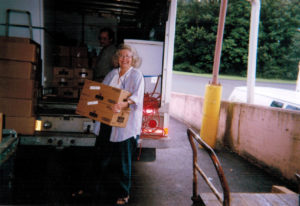

It’s Vacation Time!
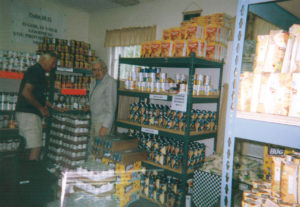
Your vacation time is here! It’s your last chance to get a break this summer. That means it’s time to go to the beach – to the mountains – to the city – ANYWHERE!
What do you have to do to get away? Well, first, find a place to go. Second, pack your bags.
FINALLY, drop off loads of food to your neighborhood food pantry before you take off on your vacation..
August is the most challenging month of the year for food pantries because it’s the month with the least amount of food available at the food bank. Food pantries get most of their food from donations and very few people donate in August. And, sadly, this carries right through to September. September brings school openings with parents getting ready for school lunches. Food pantries are often empty.
It’s my opinion that people don’t donate food to food pantries in August because they’re focused on their own activities: vacation, getting kids ready for school.
But, your neighborhood food pantry doesn’t have to be empty. There are things you can do. You can organize a food drive in your neighborhood and take the food to the food pantry. You can keep the food flowing right through to October.
Thank you in advance for thinking of things you can do for your food pantry during the leanest months of the year.
Please refer this article to your preferred social media network.
Thurman Greco

Are You Working On or Off?

A fairly common question I heard in the pantry line: “Are you working on or off?”
The first time I heard this question, I was confused. What did it mean? Actually, it referred to whether or not the person was paid in cash under the table or was paid money with withholding taken out.
Often the answer was something like: “I’ve got two days over at the food store and three days at Mrs. O……’s where I help her with her house and her office. I’m looking for a few more hours but it’s not happening.”
What this question asked was how many hours a person worked on the books and how many hours off the books. Not only was this practice illegal but it robbed workers of any benefit accrual and the opportunity to pay taxes.
Minimum wage paychecks simply don’t last a week. Individuals, families, entire households even can be employed and still live in poverty. My experience in the pantry was that more people in the pantry shopping line are employed than not.
I used to think of people as being employed or unemployed.
As I gained experience with the situation, I added another label: underemployed. So, rather than thinking in terms of employed or unemployed, I thought of hungry people in the line as being employed or underemployed.
I still see unemployed people but I realized many people aren’t paid a living wage.
I see shoppers where each person in the household works more than one job. The hope, dream, goal for many is simply to work enough hours and make enough money that a person can take a day off occasionally and have enough money to eat the following day.
People holding down more than one job often had trouble finding time to get to the Department of Social Services office to apply for SNAP (food stamps), although they might have qualified for the benefits.
Without a secure community safety net for the poor and destitute in our country, pantry volunteers needed to feed groceries weekly to families and households without money after they paid for rent and transportation to get to work.
Since the ’90s, many states have been “hell bent to Harry” to get people to work…no matter what. Welfare is no longer on the table.
A tip: Some people don’t realize our nation hasn’t offered much in the way of welfare in a long, long time. In polite conversation, I heard a statement: “That person shouldn’t be in your line. Her son has a job and she has a car.” I find it amazing that people in this country have been and continue to be comfortable denying assistance to the needy and destitute families while offering tax breaks to the wealthy.
My question was this: “How do people cope?”
Work first is not always a good option. I regularly saw pantry shoppers with family members who would be institutionalized if they weren’t being cared for by family. The institution is always the more expensive option.
The problem was that the family had nothing. So, while Helen or Sue or Fred was caring for the ill/disabled person, s/he wasn’t able to work.
Employment opportunities are a large part of the problem. People find themselves down and out in places with few job opportunities. Young people graduated from high school or college and can’t find a job anywhere.
Every economic downturn erases job opportunities. When the economy finally recovers, many jobs don’t return. Each recovery creates a class of citizens permanently living in the poverty of unemployment, underemployment, temporary employment, and day labor. Part time employment and being “on call” is a way of life.
The new group created after the downturn of 2008 had its own label: The Struggling Class.
Education costs are a factor. Fewer and fewer people can afford college or trade school. Some are afraid of the college loans they might not be able to pay off. One young woman in our food pantry line worked sixty hours weekly in low wage jobs to repay her college loan.
A fundamental attitude adjustment helped us realize food stamps, food pantries, soup kitchens, and shelters are no longer emergency concepts. They are the new way of life in the 21st century.
BEN
“I’m finished!” he blurted out. ” They fired me today!” I’ll never be able to get another job again. I’m too old!” Frightened reality covered his face when he entered the pantry for the first time. I didn’t say a word. I let him shout. He didn’t look or act as if he was going to hurt anyone and I felt he needed to release his anger.
I wanted his life to be easier than it was but what I wanted for him or any other shopper was nothing more than wishful thinking. There was little to nothing I could do. And, truthfully, I was helpless to do anything for him beyond offering a three-day-supply of food.
Every week after the first visit, he entered the pantry, shopped, and never made a sound. The mask of his face never changed.
Once the hair goes grey, it’s hard to compete in the market place. In a down economy, employers hire the younger applicants believing they’ll work harder for less money.
I hoped his unemployment would hold out until he could figure out how to get something more.
We all just left him alone. The pantry space was so small. It took him a year to calm down.
All we had was delicious, nutritious, food with a heavy emphasis on fresh vegetables and fruits. I relied on the food to make up for what we didn’t have.
I saw him recently – calm, maybe at peace with his situation. He lives in his truck, semi-homeless I suppose. He has places to bathe and sleep when he’s in Woodstock.
Woodstock attracts musicians. He’s one of those considered talented, this man. He’s found places to play around the area and he’s looking okay. What more can we all ask for anyway?
Thurman Greco
Thank you for reading this blog post. Please refer it to your favorite social media network.
Thurman
A new book is coming soon! Please be on the lookout for Miracles!
Thanks again!
Holiday Christmas Feast December 25th at Congregation Emanuel

Congregation Emanuel of the Hudson Valley at 243 Albany Avenue, Kingston, NY 12401 is having its second annual Christmas Feast on December 25th from noon until 3:00 pm.
You are invited!
Christmas Feast Holiday dinners are always a good time to get together with others and get to know new people. Holiday dinners are a good time to sit at a table and swap news stories and enjoy food with one another. The members and volunteers at Congregational Emanuel hope you’ll join us at the Feast on the 25th.
Thank you for reading this article. Please share this blog post with your friends and refer it to your preferred social network. Please don’t forget to tell your friends about this feast and share this post with your email neighbors.
Thank you –
Thurman Greco

May the coming new year bring you the best of all you need and desire.
Tom Pacheco Performs Peace Concert December 15th

Tom Pacheco, a local and extraordinary songwriter and singer/guitarist will perform his annual December Peace Concert along with Brian Hollander at 8:00 pm on Saturday, December 15th at the Rosendale Café, 434 Main Street, Rosendale.
Tom Pacheco is a much loved performer who writes poetically beautiful songs. He tells stories of life in a penetrating style which sends a message about fighting for the truth. He and Brian Hollander have played together many times at concerts in the area.
Tom Pacheco is also a personal hero of mine. His support of the food pantry as we served hungry people went beyond words. On two separate occasions, Tom Pacheco played concerts with all proceeds going to feed hungry people.
The Rosendale Café doesn’t take reservations but serves fine vegetarian food. For more information, see rosendalecafe.com or call 845-658-9048.

Tom has his own chapter in this book because of the work he did to bring food to the pantry to feed the hungry.
Thank you for reading this article. Please refer it to your favorite social media network.
Please tell all your friends, relatives, neighbors about this concert.
Thank you
Thurman Greco
Woodstock, New York
